
German postcard by Ross Verlag, no. 3953/1, 1928-1929. Photo: Terra-Film. Maria Jacobini in the Italian late silent film Il carnevale di Venezia/The Carnival of Venice (Mario Almirante 1928), a Stefano Pittaluga production. Terra-Film was the German distributor.

German postcard by Ross Verlag, no. 3955/2, 1928-1929. Photo: Terra-Film. Maria Jacobini in the Italian late silent film Il carnevale di Venezia/ Carnival in Venice (Mario Almirante 1928).

Italian postcard. by Ed. G.B. Falci, Milano, no. 87. Photo: S.A. Stefano Pittaluga. Maria Jacobini in the late silent film Il carnevale di Venezia/The Carnival of Venice (Mario Almirante, 1927).
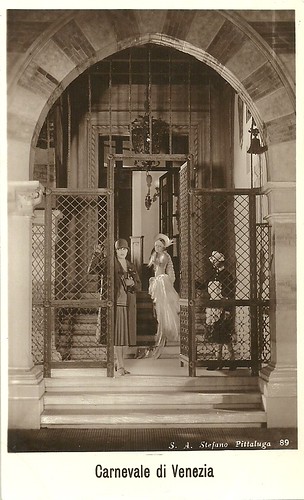
Italian postcard by Ed. G.B. Falci, Milano, no. 89. Photo: S.A. Stefano Pittaluga. Maria Jacobini and Josyane in the late silent film Il carnevale di Venezia (Mario Almirante, 1928).
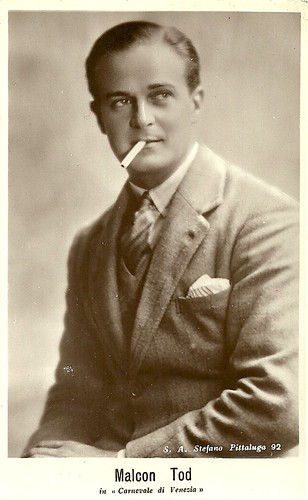
Italian postcard by Ed. G.B. Falci, Milano, no. 92. Photo: S.A. Stefano Pittaluga. Malcolm Tod in Il carnevale di Venezia (Mario Almirante, 1928).
Cheated by a ruthless, game addicted and vengeful lover
In Il carnevale di Venezia/The Carnival of Venice (Mario Almirante, 1928) the young and rich American Jefferson (Malcolm Tod) buys at an auction the ancient residence of the financially struggling Venetian nobleman, Duca (Duke) Morosin (Bonaventura Ibanez). Gabriella (Maria Jacobini), who as a child had been told about the sumptuous palace by her mother, attends the auction.
On the occasion she casually meets Germaine (Josyane), who is trying to get Jefferson to marry her, and the two young women become friends. Shortly afterwards Gabriella becomes engaged to Giorgio (Manlio Mannozzi), but he later leaves her for Aix-les-Bains. Germaine also leaves for the spa resort, again following Jefferson. She is accompanied by Gabriella, who discovers Giorgio's gambling habit. He is ruthless and vengeful. In tears, she is comforted by Jefferson who does not know her identity.
Germaine hosts the desperate Gabriella. Thus Jefferson meets again the stranger he had seen in tears. He first hires her as an assistant and then falls in love with her. Having all returned to Venice, chance has it that during Carnival, Duke Morosin recognises in Gabriella the fruit of a youthful love affair of his late son that he had opposed. Repentant, he welcomes the girl into the family and Gabriella, now Duchess Morosin, can marry Jefferson. The noble palace is also saved.
The story of Il carnevale di Venezia/The Carnival of Venice was written by Michel Linsky and Pier Angelo Mazzolotti. The film's sets were designed by the art director Giulio Lombardozzi. Il Carnevale di Venezia was one of the six films made for the 1927-1928 film season by Stefano Pittaluga's Turin-based company S.A.S.P., which at the time remained the most important Italian film production company after the profound crisis that had affected this sector in the post-war period.
The film was a success with Italian audiences when it was released in early February 1928, partly because of the scarcely clad bathers at the Lido in the film. Despite this success, nationalist Italian critics didn't like the fact that the villain was Italian and the hero American. So the film was taken from circulation and when Il carnevale di Venezia/The Carnival of Venice (1928) was re-released the roles were reversed. The American hero had become an Italian named Albani and the villain a foreigner with an English name.
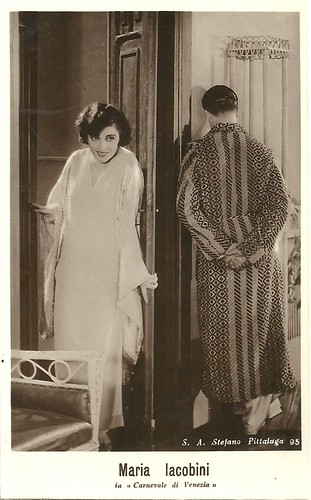
Italian postcard by Ed. G.B. Falci, Milano, no. 95. Photo: S.A. Stefano Pittaluga. Maria Jacobini and Malcolm Tod in Il carnevale di Venezia (Mario Almirante, 1928).
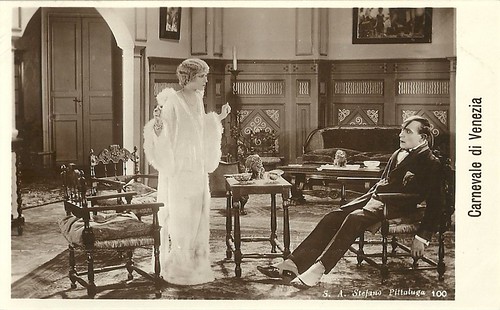
Italian postcard by Ed. G.B. Falci, Milano, no. 100. Photo: S.A. Stefano Pittaluga. Josyane in Il carnevale di Venezia (Mario Almirante, 1928).

Italian postcard by Ed. G. B. Falci, Milano, no. 101. Photo: S.A. Stefano Pittaluga. Scene from Carnevale di Venezia (Mario Almirante, 1928).
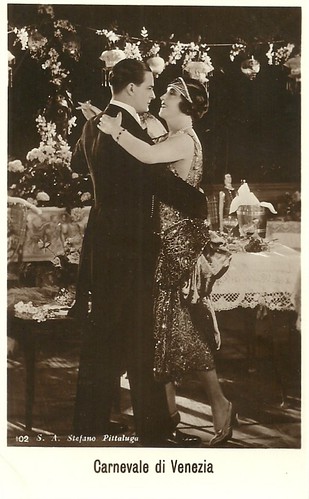
Italian postcard by Ed. G.B. Falci, Milano, no. 102. Photo: S.A. Stefano Pittaluga. Maria Jacobini and Malcolm Tod in Il carnevale di Venezia (Mario Almirante, 1928).
Who was Josyane?
Leading lady of Il carnevale di Venezia/The Carnival of Venice (1928) was Maria Jacobini, who had come back from Germany for this film. Among the Italian divas, she was an 'island of serenity', as film historian Vittorio Martinelli expressed it. She was the personification of goodness, of simple love. Her weapon was her sweet and gracious smile.
Confident of an international distribution, Pittaluga gave some other roles to foreign actors and actresses known at the time. The American Jefferson was played by Malcolm Tod (1897-?), a British actor who was a star of European silent cinema of the 1920s. Germaine was played by Josyane, but who was she?
Josyane, a.k.a. Josyane Andrei, was born as Marcelle Joséphine Renée Marguerite Leroux in Granville, Manche, Basse-Normandie. The French actress made her film debut as the leading lady in L'aube du sang/The Dawn of Blood (Giuseppe Guarino, 1924) opposite Edmond van Daële. She became a star of the French cinema of the 1920s and early 1930s and acted in 14 films.
She played the title role in Le mariage de Rosine/Rosine's Wedding (Pierre Colombier, 1925) and acted in La course du flambeau/The Torch Race (Luitz Morat, 1925). Her final French film was the comedy Coiffeur pour dames/Ladies Hairdresser (René Guissart, 1932), starring a young Fernand Gravey. In Belgium, she later appeared in the sound comedy Gardons notre sourire/Let's keep smiling (Gaston Schoukens, 1939), according to IMDb. Josyane died in 1999 in Boulogne-Billancourt, Hauts-de-Seine, Île-de-France, France. She was 97.
Il carnevale di Venezia was Josyane's sole Italian film. She played the second female role, Germaine Normand. Sadly, Il Carnevale di Venezia (Mario Almirante, 1928) is considered a lost film. Only the ‘trailer’ is now available and can be seen at the Cineteca Nazionale.
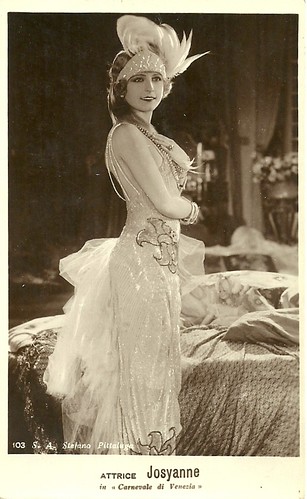
Italian postcard by Ed. G.B. Falci, Milano, no. 103. Photo: S.A. Stefano Pittaluga. Josyane in Il carnevale di Venezia (Mario Almirante, 1928).

Italian postcard by Ed. G. B. Falci, Milano, no. 105. Photo: S.A. Stefano Pittaluga. Josyane in Carnevale di Venezia (Mario Almirante, 1928).

Italian postcard by Ed. G.B. Falci, Milano, no. 106. Photo: S.A. Stefano Pittaluga. Maria Jacobini and Malcolm Tod in Il carnevale di Venezia (Mario Almirante, 1928).
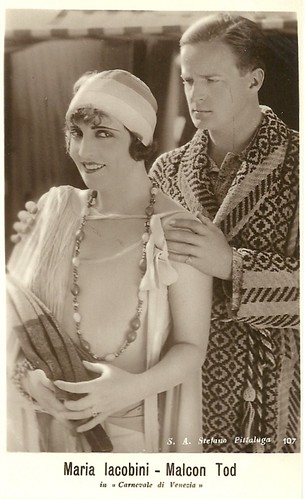
Italian postcard by Ed. G.B. Falci, Milano, no. 107. Photo: S.A. Stefano Pittaluga. Maria Jacobini and Malcolm Tod in Il carnevale di Venezia (Mario Almirante, 1928).
Sources: Vittorio Martinelli (Il cinema muto italiano: I film degli anni venti, 1921 - Italian), Wikipedia (English and Italian) and IMDb.
This post was last updated on 27 May 2024.
No comments:
Post a Comment